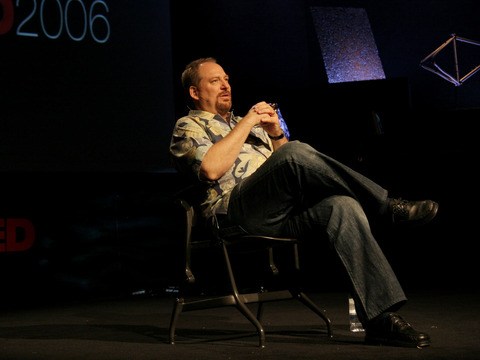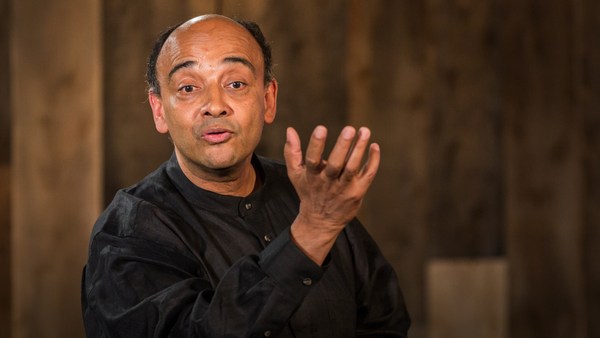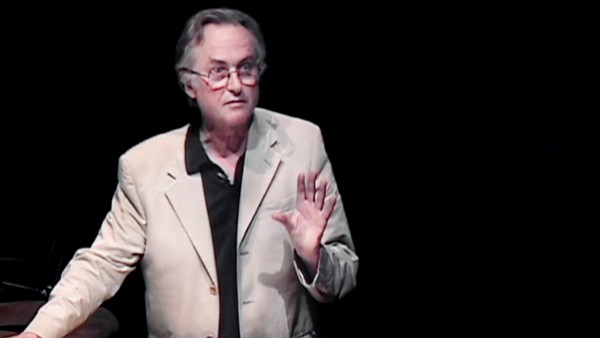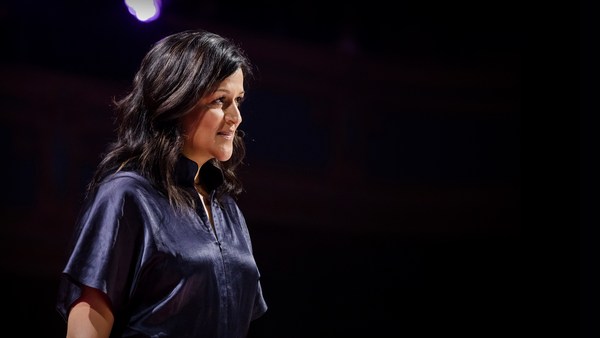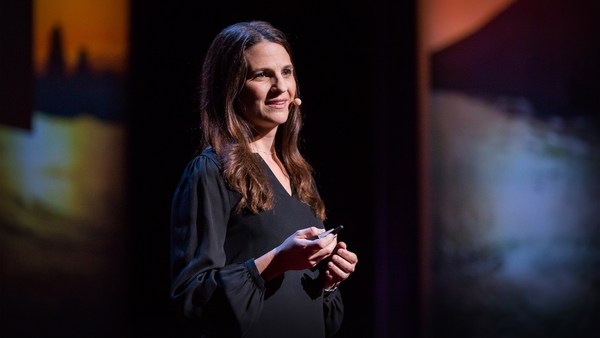It's wonderful to be back. I love this wonderful gathering. And you must be wondering, "What on earth? Have they put up the wrong slide?" No, no. Look at this magnificent beast, and ask the question: Who designed it?
This is TED; this is Technology, Entertainment, Design, and there's a dairy cow. It's a quite wonderfully designed animal. And I was thinking, how do I introduce this? And I thought, well, maybe that old doggerel by Joyce Kilmer, you know: "Poems are made by fools like me, but only God can make a tree." And you might say, "Well, God designed the cow."
But, of course, God got a lot of help. This is the ancestor of cattle. This is the aurochs. And it was designed by natural selection, the process of natural selection, over many millions of years. And then it became domesticated, thousands of years ago. And human beings became its stewards, and, without even knowing what they were doing, they gradually redesigned it and redesigned it and redesigned it. And then more recently, they really began to do reverse engineering on this beast and figure out just what the parts were, how they worked and how they might be optimized -- how they might be made better.
Now, why am I talking about cows? Because I want to say that much the same thing is true of religions. Religions are natural phenomena -- they're just as natural as cows. They have evolved over millennia. They have a biological base, just like the aurochs. They have become domesticated, and human beings have been redesigning their religions for thousands of years. This is TED, and I want to talk about design. Because what I've been doing for the last four years -- really since the first time you saw me -- some of you saw me at TED when I was talking about religion -- and in the last four years, I've been working just about non-stop on this topic. And you might say it's about the reverse engineering of religions. Now that very idea, I think, strikes terror in many people, or anger, or anxiety of one sort or another. And that is the spell that I want to break.
I want to say, no, religions are an important natural phenomenon. We should study them with the same intensity that we study all the other important natural phenomena, like global warming, as we heard so eloquently last night from Al Gore. Today's religions are brilliantly designed -- brilliantly designed. They are immensely powerful social institutions and many of their features can be traced back to earlier features that we can really make sense of by reverse engineering. And, as with the cow, there's a mixture of evolutionary design -- designed by natural selection itself -- and intelligent design -- more or less intelligent design -- and redesigned by human beings who are trying to redesign their religions.
You don't do book talks at TED, but I'm going to have just one slide about my book, because there is one message in it which I think this group really needs to hear. And I would be very interested to get your responses to this. It's the one policy proposal that I make in the book, at this time, when I claim not to know enough about religion to know what other policy proposals to make. And it's one that echoes remarks that you've heard already today.
Here's my proposal, I'm going to just take a couple of minutes to explain it: Education on world religions for all of our children -- in primary school, in high school, in public schools, in private schools and in home schooling. So what I'm proposing is, just as we require reading, writing, arithmetic, American history, so we should have a curriculum on facts about all the religions of the world -- about their history, about their creeds, about their texts, their music, their symbolisms, their prohibitions, their requirements. And this should be presented factually, straightforwardly, with no particular spin, to all of the children in the country. And as long as you teach them that, you can teach them anything else you like. That, I think, is maximal tolerance for religious freedom. As long as you inform your children about other religions, then you may -- and as early as you like and whatever you like -- teach them whatever creed you want them to learn. But also let them know about other religions.
Now, why do I say that? Because democracy depends on an informed citizenship. Informed consent is the very bedrock of our understanding of democracy. Misinformed consent is not worth it. It's like a coin flip; it doesn't count, really. Democracy depends on informed consent. This is the way we treat people as responsible adults. Now, children below the age of consent are a special case. Parents -- I'm going to use a word that Pastor Rick just used -- parents are stewards of their children. They don't own them. You can't own your children. You have a responsibility to the world, to the state, to them, to take care of them right. You may teach them whatever creed you think is most important, but I say you have a responsibility to let them be informed about all the other creeds in the world, too.
The reason I've taken this time is I've been fascinated to hear some of the reactions to this. One reviewer for a Roman Catholic newspaper called it "totalitarian." It strikes me as practically libertarian. Is it totalitarian to require reading, writing and arithmetic? I don't think so. All I'm saying is -- and facts, facts only; no values, just facts -- about all the world's religions. Another reviewer called it "hilarious." Well, I'm really bothered by the fact that anybody would think that was hilarious. It seems to me to be such a plausible, natural extension of the democratic principles we already have that I'm shocked to think anybody would find that just ridiculous. I know many religions are so anxious about preserving the purity of their faith among their children that they are intent on keeping their children ignorant of other faiths. I don't think that's defensible. But I'd really be pleased to get your answers on that -- any reactions to that -- later.
But now I'm going to move on. Back to the cow. This picture, which I pulled off the web -- the fellow on the left is really an important part of this picture. That's the steward. Cows couldn't live without human stewards -- they're domesticated. They're a sort of ectosymbiont. They depend on us for their survival. And Pastor Rick was just talking about sheep. I'm going to talk about sheep, too. There's a lot of serendipitous convergence here. How clever it was of sheep to acquire shepherds!
(Laughter)
Think of what this got them. They could outsource all their problems: protection from predators, food-finding ...
(Laughter)
... health maintenance.
(Laughter)
The only cost in most flocks -- not even this -- a loss of free mating. What a deal! "How clever of sheep!" you might say. Except, of course, it wasn't the sheep's cleverness. We all know sheep are not exactly rocket scientists -- they're not very smart. It wasn't the cleverness of the sheep at all. They were clueless. But it was a very clever move. Whose clever move was it? It was the clever move of natural selection itself.
Francis Crick, the co-discoverer of the structure of DNA with Jim Watson, once joked about what he called Orgel's Second Rule. Leslie Orgel is a molecular biologist, brilliant guy, and Orgel's Second Rule is: Evolution is cleverer than you are. Now, that is not Intelligent Design -- not from Francis Crick. Evolution is cleverer than you are. If you understand Orgel's Second Rule, then you understand why the Intelligent Design movement is basically a hoax.
The designs discovered by the process of natural selection are brilliant, unbelievably brilliant. Again and again biologists are fascinated with the brilliance of what's discovered. But the process itself is without purpose, without foresight, without design. When I was here four years ago, I told the story about an ant climbing a blade of grass. And why the ant was doing it was because its brain had been infected with a lancet fluke that was needed to get into the belly of a sheep or a cow in order to reproduce. So it was sort of a spooky story.
And I think some people may have misunderstood. Lancet flukes aren't smart. I submit that the intelligence of a lancet fluke is down there, somewhere between petunia and carrot. They're not really bright. They don't have to be. The lesson we learn from this is: you don't have to have a mind to be a beneficiary. The design is there in nature, but it's not in anybody's head. It doesn't have to be. That's the way evolution works. Question: Was domestication good for sheep? It was great for their genetic fitness.
And here I want to remind you of a wonderful point that Paul MacCready made at TED three years ago. Here's what he said: "Ten thousand years ago, at the dawn of agriculture, human population, plus livestock and pets, was approximately a tenth of one percent of the terrestrial vertebrate landmass." That was just 10,000 years ago. Yesterday, in biological terms. What is it today? Does anybody remember what he told us? 98 percent. That is what we have done on this planet.
Now, I talked to Paul afterwards -- I wanted to check to find out how he'd calculated this, and get the sources and so forth -- and he also gave me a paper that he had written on this. And there was a passage in it which he did not present here and I think it is so good, I'm going to read it to you: "Over billions of years on a unique sphere, chance has painted a thin covering of life: complex, improbable, wonderful and fragile. Suddenly, we humans -- a recently arrived species no longer subject to the checks and balances inherent in nature -- have grown in population, technology and intelligence to a position of terrible power. We now wield the paintbrush." We heard about the atmosphere as a thin layer of varnish. Life itself is just a thin coat of paint on this planet. And we're the ones that hold the paintbrush. And how can we do that?
The key to our domination of the planet is culture. And the key to culture is religion. Suppose Martian scientists came to Earth. They would be puzzled by many things. Anybody know what this is? I'll tell you what it is. This is a million people gathering on the banks of the Ganges in 2001, perhaps the largest single gathering of human beings ever, as seen from satellite photograph. Here's a big crowd. Here's another crowd in Mecca. Martians would be amazed by this. They'd want to know how it originated, what it was for and how it perpetuates itself.
Actually, I'm going to pass over this. The ant isn't alone. There's all sorts of wonderful cases of species which -- in that case -- A parasite gets into a mouse and needs to get into the belly of a cat. And it turns the mouse into Mighty Mouse, makes it fearless, so it runs out in the open, where it'll be eaten by a cat. True story. In other words, we have these hijackers -- you've seen this slide before, from four years ago -- a parasite that infects the brain and induces even suicidal behavior, on behalf of a cause other than one's own genetic fitness.
Does that ever happen to us? Yes, it does -- quite wonderfully. The Arabic word "Islam" means "submission." It means "surrender of self-interest to the will of Allah." But I'm not just talking about Islam. I'm talking also about Christianity. This is a parchment music page that I found in a Paris bookstall 50 years ago. And on it, it says, in Latin: "Semen est verbum Dei. Sator autem Christus." The word of God is the seed and the sower of the seed is Christ. Same idea. Well, not quite. But in fact, Christians, too ... glory in the fact that they have surrendered to God. I'll give you a few quotes. "The heart of worship is surrender. Surrendered people obey God's words, even if it doesn't make sense." Those words are by Rick Warren. Those are from "The Purpose Driven Life."
And I want to turn now, briefly, to talk about that book, which I've read. You've all got a copy, and you've just heard the man. And what I want to do now is say a bit about this book from the design standpoint, because I think it's actually a brilliant book. First of all, the goal -- and you heard just now what the goal is -- it's to bring purpose to the lives of millions, and he has succeeded. Is it a good goal? In itself, I'm sure we all agree, it is a wonderful goal. He's absolutely right. There are lots of people out there who don't have purpose in their life, and bringing purpose to their life is a wonderful goal. I give him an A+ on this.
(Laughter)
Is the goal achieved? Yes. Thirty million copies of this book. Al Gore, eat your heart out.
(Laughter)
Just exactly what Al is trying to do, Rick is doing. This is a fantastic achievement. And the means -- how does he do it?
It's a brilliant redesign of traditional religious themes -- updating them, quietly dropping obsolete features, putting new interpretations on other features. This is the evolution of religion that's been going on for thousands of years, and he's just the latest brilliant practitioner of it. I don't have to tell you this; you just heard the man. Excellent insights into human psychology, wise advice on every page. Moreover, he invites us to look under the hood. I really appreciated that. For instance, he has an appendix where he explains his choice of translations of different Bible verses. The book is clear, vivid, accessible, beautifully formatted. Just enough repetition. That's really important. Every time you read it or say it, you make another copy in your brain. Every time you read it or say it, you make another copy in your brain.
(Laughter)
With me, everybody --
(Audience and Dan Dennett) Every time you read it or say it, you make another copy in your brain.
Thank you.
And now we come to my problem. Because I'm absolutely sincere in my appreciation of all that I said about this book. But I wish it were better. I have some problems with the book. And it would just be insincere of me not to address those problems. I wish he could do this with a revision, a Mark 2 version of his book. "The truth will set you free." That's what it says in the Bible, and it's something that I want to live by, too.
My problem is, some of the bits in it I don't think are true. Now some of this is a difference of opinion. And that's not my main complaint, that's worth mentioning. Here's a passage -- it's very much what he said, anyway: "If there was no God we would all be accidents, the result of astronomical random chance in the Universe. You could stop reading this book because life would have no purpose or meaning or significance. There would be no right or wrong and no hope beyond your brief years on Earth." Now, I just do not believe that. By the way, I find -- Homer Groening's film presented a beautiful alternative to that very claim. Yes, there is meaning and a reason for right or wrong. We don't need a belief in God to be good or to have meaning in us. But that, as I said, is just a difference of opinion. That's not what I'm really worried about.
How about this: "God designed this planet's environment just so we could live in it." I'm afraid that a lot of people take that sentiment to mean that we don't have to do the sorts of things that Al Gore is trying so hard to get us to do. I am not happy with that sentiment at all. And then I find this: "All the evidence available in the biological sciences supports the core proposition that the cosmos is a specially designed whole with life and mankind as its fundamental goal and purpose, a whole in which all facets of reality have their meaning and explanation in this central fact." Well, that's Michael Denton. He's a creationist. And here, I think, "Wait a minute." I read this again. I read it three or four times and I think, "Is he really endorsing Intelligent Design? Is he endorsing creationism here?" And you can't tell. So I'm sort of thinking, "Well, I don't know, I don't know if I want to get upset with this yet."
But then I read on, and I read this: "First, Noah had never seen rain, because prior to the Flood, God irrigated the earth from the ground up." I wish that sentence weren't in there, because I think it is false. And I think that thinking this way about the history of the planet, after we've just been hearing about the history of the planet over millions of years, discourages people from scientific understanding. Now, Rick Warren uses scientific terms and scientific factoids and information in a very interesting way.
Here's one: "God deliberately shaped and formed you to serve him in a way that makes your ministry unique. He carefully mixed the DNA cocktail that created you." I think that's false. Now, maybe we want to treat it as metaphorical. Here's another one: "For instance, your brain can store 100 trillion facts. Your mind can handle 15,000 decisions a second." Well, it would be interesting to find the interpretation where I would accept that. There might be some way of treating that as true. "Anthropologists have noted that worship is a universal urge, hardwired by God into the very fiber of our being -- an inbuilt need to connect with God." Well, the sense of which I agree with him, except I think it has an evolutionary explanation.
And what I find deeply troubling in this book is that he seems to be arguing that if you want to be moral, if you want to have meaning in your life, you have to be an Intelligent Designer, you have to deny the theory of evolution by natural selection. And I think, on the contrary, that it is very important to solving the world's problems that we take evolutionary biology seriously. Whose truth are we going to listen to? Well, this is from "The Purpose Driven Life": "The Bible must become the authoritative standard for my life: the compass I rely on for direction, the counsel I listen to for making wise decisions, and the benchmark I use for evaluating everything." Well maybe, OK, but what's going to follow from this?
And here's one that does concern me. Remember I quoted him before with this line: "Surrendered people obey God's word, even if it doesn't make sense." And that's a problem.
(Sighs)
"Don't ever argue with the Devil. He's better at arguing than you are, having had thousands of years to practice." Now, Rick Warren didn't invent this clever move. It's an old move. It's a very clever adaptation of religions. It's a wild card for disarming any reasonable criticism. "You don't like my interpretation? You've got a reasonable objection to it? Don't listen, don't listen! That's the Devil speaking." This discourages the sort of reasoning citizenship it seems to me that we want to have.
I've got one more problem, then I'm through. And I'd really like to get a response if Rick is able to do it. "In the Great Commission, Jesus said, 'Go to all people of all nations and make them my disciples. Baptize them in the name of the Father, the Son and the Holy Spirit, and teach them to do everything I've told you.'" The Bible says Jesus is the only one who can save the world. We've seen many wonderful maps of the world in the last day or so. Here's one, not as beautiful as the others; it simply shows the religions of the world. Here's one that shows the sort of current breakdown of the different religions.
Do we really want to commit ourselves to engulfing all the other religions, when their holy books are telling them, "Don't listen to the other side, that's just Satan talking!"? It seems to me that that's a very problematic ship to get on for the future. I found this sign as I was driving to Maine recently, in front of a church: "Good without God becomes zero." Sort of cute. A very clever little meme. I don't believe it and I think this idea, popular as it is -- not in this guise, but in general -- is itself one of the main problems that we face.
If you are like me, you know many wonderful, committed, engaged atheists, agnostics, who are being very good without God. And you also know many religious people who hide behind their sanctity instead of doing good works. So, I wish we could drop this meme. I wish this meme would go extinct.
Thanks very much for your attention.
(Applause)
